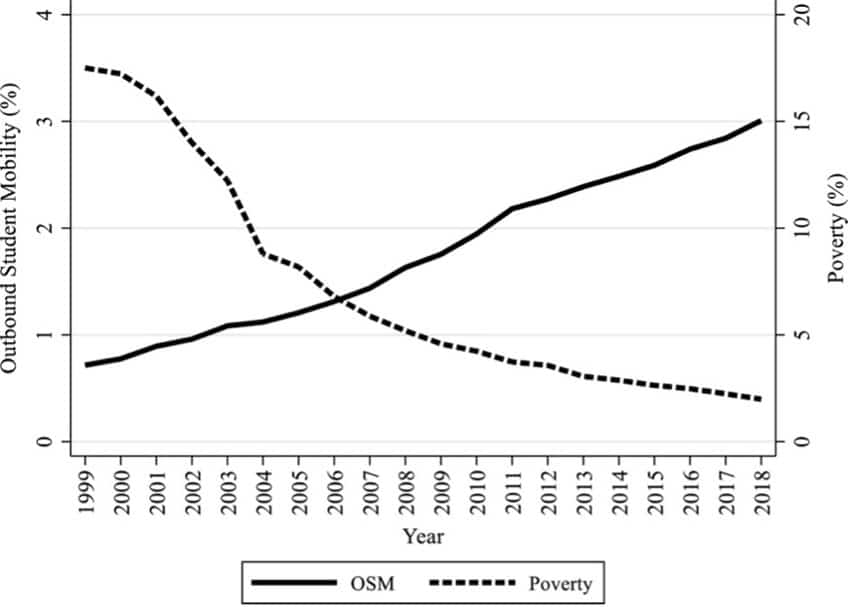Research shows link between study abroad and poverty alleviation
- International students embark on study abroad to pursue knowledge, credentials, and upward mobility, but they also gain the potential to drive development and innovation in their home countries
- A new study shows the impact international student mobility can have on national and global progress and security
A new study finds that when international students from low- to middle-income countries return home after studying abroad, they help to alleviate poverty in their societies – not immediately, but over a period of about 15 years.
The study, International student mobility and poverty reduction: A cross-national analysis of low- and middle-income countries, was conducted and authored by Joonghyun Kwak and Maia Chankseliani and appears in The International Journal of Educational Research.
The authors write that they pursued the study because while there is ample research on the positive effects of study abroad on individual students (e.g., upward social mobility and income), there is not much on its effect on whole societies.
There is a complex methodology underlying the findings, which can be explored here, but we will limit our coverage to the study’s main findings and takeaways.
Long-term benefits
The authors looked at the relationship between global study mobility from 1999–2018 and poverty levels in 43 low- or middle-income countries. They found that the impact of international student returnees on poverty levels happens gradually over a 15-year period.
The following chart shows that as international student mobility increased over time, poverty in the sampled countries went down. The difference between poverty levels in 1999 and 2018 is quite striking.

The intangible good of transnational spaces
When students decide to study abroad, they aren’t just border-hopping to access a more developed country’s education system, even if they might think of it that way initially. When they are abroad, they not only acquire new skills and credentials, but they also enter what the authors call a “transnational” space where different cultures and worldviews are shared.
This intangible – even unexpected – space is also populated with other international students with the same drive for progress, success, and knowledge. The transnational space is full of connections that students take back with them if they return home.
Back at home, students’ skills and global understanding tend to drive economic and social development. Their success and immersion in new environments abroad provides them with newfound agency that can empower them to work towards innovation and progress, which reverberates across their society. For example:
“Returnees can use their connections formed abroad to build bridges between their home countries and global networks of resources, innovation, and knowledge …. These global connections enable the exchange of ideas and resources, promoting cooperation and supporting local economic development. For example, returnees can attract investments or support for poverty alleviation projects in their own communities ….
Armed with technical expertise and an entrepreneurial spirit, returnees may introduce new technologies and methods to sectors like health, science, and business.”
Issues to consider
The authors make the important point that at an individual level, most international students are not from households experiencing extreme poverty. Study abroad is very expensive, and relatively affluent families are best positioned to pursue it. This underlines the crucial role of government and institution-level scholarships for poorer international students. The authors note: “We contend that students’ exposure to diverse cultures and perspectives abroad leads to a transformation in how they perceive and engage with their home countries.” Poorer students deserve that opportunity, too.
The other caveat is that not all international students return to their home countries. Many see study abroad as the first step towards emigration, which leads to a certain amount of brain drain.
Targeted scholarships and short-term exchanges are important in this respect. Here are two examples of initiatives designed to help students to contribute to their home countries through study abroad:
- The DAAD Helmut-Schmidt Masters Scholarships for Public Policy and Good Governance, which are offered by the German government to outstanding students from developing countries. They allow international recipients to obtain a master’s degree in disciplines of special relevance for the social, political, and economic development of their home country at German institutions of higher education.
- Canada-CARICOM Skills Training for the Green Economy (CCSTGE) Scholarships are a short-term exchange opportunity. The Canadian government offers funding for students from Caribbean countries for one or two semesters in fields such as climate-smart agriculture, sustainable culinary practices, renewable energy, and sustainable building techniques.
In general, we are seeing more activity in international research collaborations between so-called Global North and Global South universities. As the world moves further from colonialist assumptions, two-way mobility agreements that benefit both traditional destinations and emerging economies are becoming more common.
















